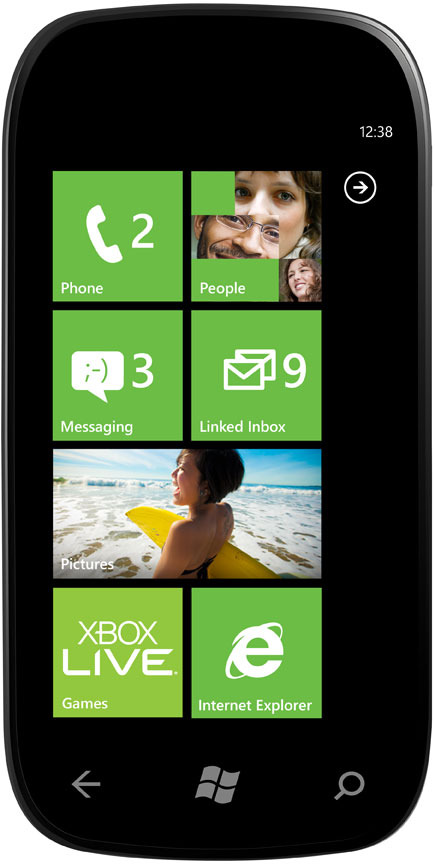
A few days ago Microsoft offered up a public unveiling of the next major release of Windows Phone, codenamed “Mango” (quite why it’s code-named this I have no idea). While other companies, such as Apple and Google, have gone with lots of small updates in between annual major refreshes, Microsoft appear to be backing a more pedestrian update schedule. Sure, we seem to be getting a major new version every 12 months, but instead of lots of minor bug fixes and updates in between, so far we’ve only received one “service pack” style update since the original Windows Phone launch late last year. Mango appears to be quite a significant upgrade over the original, with a large number of improvements across the board. Does it bring it in line with iOS 4 and Android Honeycomb? Not sure, but it’s certainly got a wealth of very welcome new features and improvements.
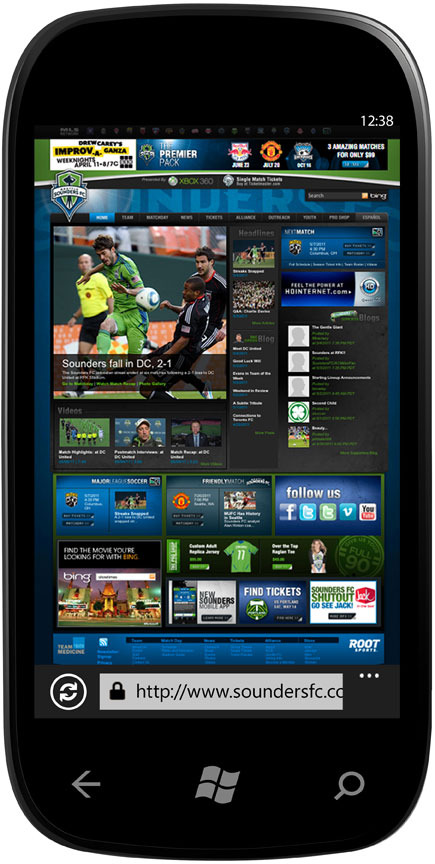
One new feature I am particularly looking forward to is the upgrade to Internet Explorer on Windows Phone, now boasting the same hardware-accelerated rendering engine as found on desktop Internet Explorer 9. This means that going forward both desktop Windows and Windows Phone should feature the exact same browser, with excellent support for HTML5 web sites. Whether this means better support for YouTube, for example, and other media-rich sites won’t be known, I guess, until the final version of Mango ships this Christmas. But as I’ve been finding myself using IE on Windows Phone a lot this year, any improvements to the browsing experience are welcome in my books. Certainly, the demos we’ve already seen are quite impressive, and it looks as though Windows Phone is more than a match for Safari on iOS. This should also make WebApps a lot more appealing to use.
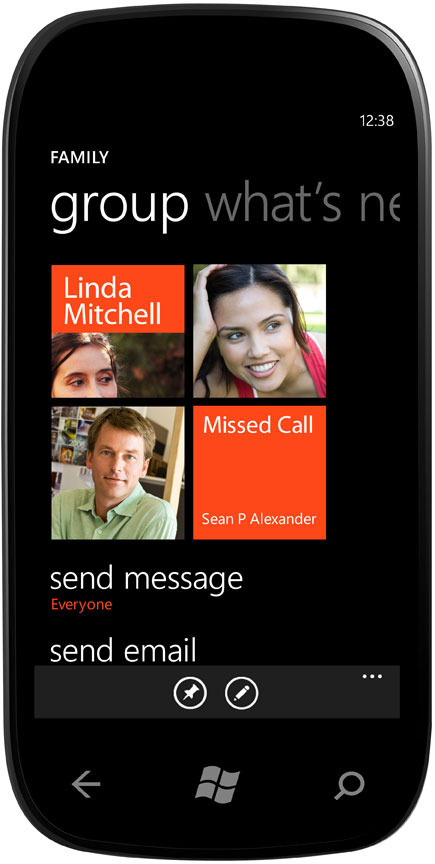
Contact management has also been improved in Mango, with one of the more exciting new features being Groups. From what I understand, in Mango you can now select several contacts and place them in their own Group, and then undertake bulk communication situations such as bulk e-mail or bulk SMS. In the above picture, you can see how contacts can be grouped around the notion of “Family”, and by pinning this as a Live Tile to your Start screen, you can quickly access their latest photos, status updates, and contact details - all from the one place. This seems like quite a handy feature to have, as right now the Contacts management situation on Windows Phone is quite limited. I really like how the Group Live Tile will combine photo and status updates from all the Contacts in the group as well, making it look and feel quite attractive to the end user.
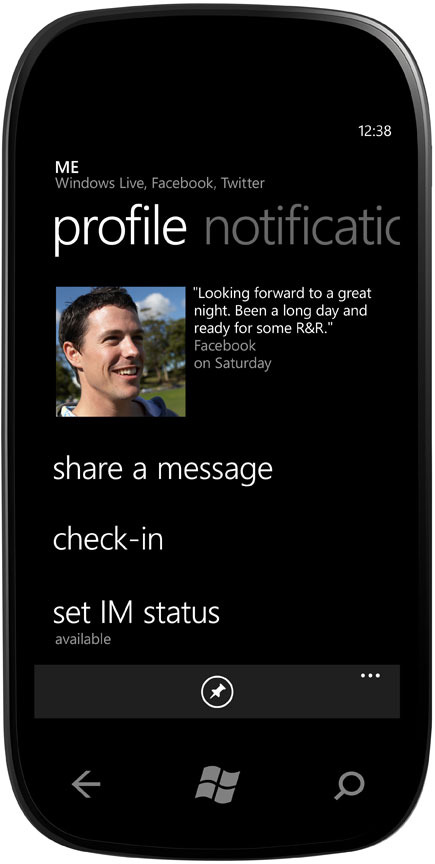
The first version of Windows Phone featured some good integration with Windows Live and Facebook, and in Windows Phone Mango this is being expanded greatly. Not only is the Facebook integration becoming a lot deeper and more pervasive (such as direct check in to Places), but direct support for Twitter and LinkedIn (a business social network) is being included. As someone who uses all of these services, this is all very welcome. In fact, anything that makes Twitter easier to use on Windows Phone is a win in my books. This should all link in nicely through the People hub, and direct linking of Contacts on the phone to Twitter accounts sounds like such a good idea. Windows Live Messenger support is also being added through the Messaging hub, which is great - as is the ability to cleanly switch between SMS, Facebook chat, and Live Messenger chat on a per-Contact basis. Great stuff!
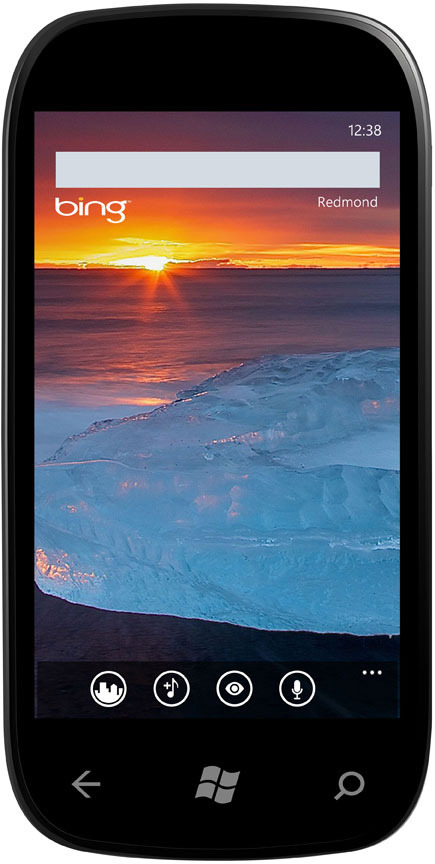
I will be honest - I use Bing on a daily basis, both on my home and work PCs, but also on Windows Phone. And while it was necessary to fiddle with the Bing app on Windows Phone to get some of the better functionality out of it here in Australia (it gets a bit crippled down under), I love having easy one-button access to the search engine. Bing is being heavily upgraded in Windows Phone Mango, with some great new features around finding what you need quickly. Bing Vision sounds like Microsoft’s answer to Google Goggles (point the camera at something and it’ll do a visual search), while Bing Audio is essentially Shazam music searching integrated directly into Bing. Bing Voice, meanwhile, sounds quite cool - who doesn’t want the ability to simply speak your search request? I bet it doesn’t recognise your voice very well, but I hope to be proven wrong later this year.
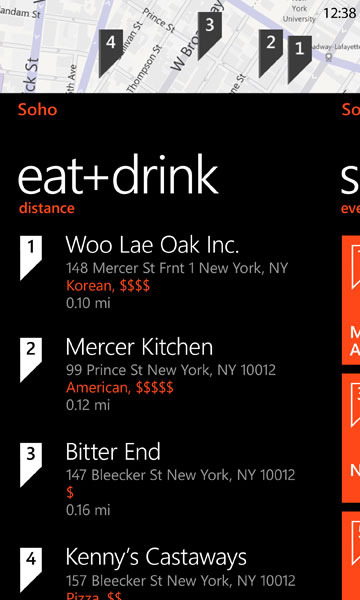
Local Scout is one of the cooler features of Bing, and is one that I desperately hope comes down to us Australian users with Mango. The basic idea is to use Bing and the GPS within the phone to find local places that fit under a group of categories, such as “eat+drink”. You can check out reviews and recommendations, see what other local users like, all from the Bing application within every Windows Phone. Right now, I am using Foursquare for this sort of task, but it’s limited to what people have written directly in Foursquare about a particular place. What Bing Local Scout appears to be doing is a bit more clever, leveraging what Bing finds on the entire Web about a particular place and then including that directly into the individual cards for each establishment. Hopefully this should mean more details about various places, which in turn means better recommendations for the end user.
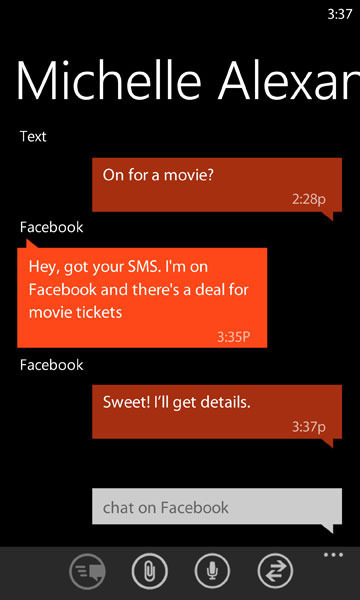
Overall, while it is still very early days for Windows Phone Mango, I am very impressed with the feature set already announced. This all sounds like solid improvements over the original, although Windows Phone does still feel like it has a long way to go before it is a serious challenger to iOS and Android on features alone. Where it is already light years ahead, however, and this is the primary reason why I use Windows Phone, is in the amazing Metro UI design that sits across every single application and feature. The fact is, Windows Phone is a gorgeous OS to use, and truly innovative in so many ways. This is more than a static grid of icons, and Mango simply builds on this solid foundation with some great new features. I really do want Windows Phone to succeed in the marketplace, because all bias aside it simply is the best smartphone OS out there right now.